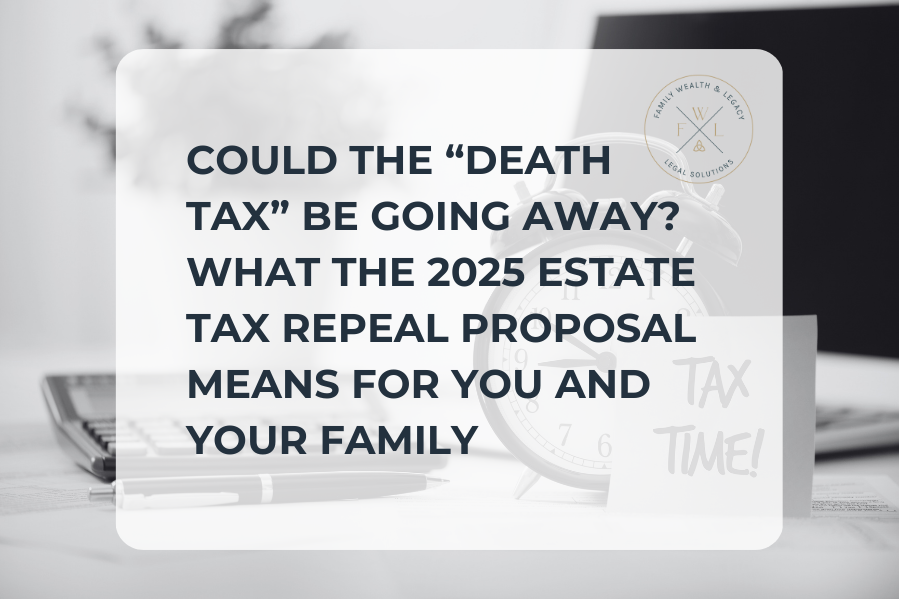Imagine working your whole life to build something meaningful — your business, your savings, your home — only to have a portion taken away after your death before it ever reaches the people you love. That’s the reality some families face when it comes to the federal estate tax — often referred to as the “death tax.”
But a new legislative proposal — the Death Tax Repeal Act of 2025 — aims to eliminate the federal estate tax altogether. For Illinois residents, there are a few proposals to change our state estate tax as well. So what would that mean for your family, and how could it impact your financial legacy?
Let’s explore the possibilities—and the implications.
The Federal Estate Tax: Current Status, History and Explanation
The estate tax has been part of our tax system for over 100 years. It currently applies to estates valued above $13.99 million per person (or $27.98 million for married couples) in 2025. Any assets above that exemption amount are taxed at a rate of 40%. That means if your estate exceeds the limit, nearly half of anything above it could go to the IRS.
Unless Congress acts, that exemption is scheduled to be cut in half at the end of 2025, reverting to pre-2018 levels adjusted for inflation — estimated to be around $7 million per individual in 2026. This sunset provision under the Tax Cuts and Jobs Act creates a limited-time opportunity for families to lock in today’s higher exemption through strategic gifting and planning. The clock is ticking for high-net-worth individuals to take advantage of this window.
Proponents of repeal argue that this tax is a form of double taxation. The assets in your estate were already taxed during your lifetime as you earned income and any capital gains you made along the way — so why tax them again at death? Critics would argue that the wealth gap in our country must be addressed, the estate tax encourages charitable giving, and that it is necessary to address the non-payment of capital gains tax and basis adjustment of assets at death, prior to them passing to the next generation.
Since its introduction in 1916, the federal estate tax exemption has fluctuated drastically. Twenty-five years ago, in 2000 the estate tax exemption was $675,000, with a 55% tax rate. In 2011, Obama’s administration raised the exemption to $5 million with a 35% tax rate. Then, in 2018 Trump’s administration increased the exemption to $11.18 million, with a tax rate of 40%.
Regardless of your views on whether double taxation as a result of death is financial government overreach, or if the wealth gap has grown too large and wealth distribution is necessary — the only obvious fact is that with a simple congressional vote and the stroke of a pen, all of these rules can change in any given year, as they drastically have over my lifetime.
What the Death Tax Repeal Act of 2025 Proposes
The Death Tax Repeal Act of 2025 (DTRA) would eliminate the federal estate tax altogether. Here’s what that could mean:
Benefits for Families and Business Owners
- Family-owned businesses and farms could stay intact across generations without being sold off to pay the IRS.
- Simplified estate planning, with less reliance on complex tax-avoidance structures.
- More flexibility for charitable giving, driven by values rather than tax incentives.
Potential Drawbacks and Broader Impact
- The estate tax generates billions in annual revenue. Eliminating it would require replacing that income, potentially with taxes that more directly impact middle-income families, as opposed to the top 10% currently subject to the estate tax exemption.
- Many economists warn that removing the estate tax could increase intergenerational wealth inequality, concentrating power and assets within fewer families.
As always, the big question is: how do we balance protecting our families with ensuring a fair and thriving economy?
For a nonpartisan look at the historical and current state of the estate tax, visit the Tax Policy Center’s Briefing Book, which includes an entire section on estate and gift taxation.
How This Could Affect Your Estate Plan
Whether or not DTRA passes, it’s essential to understand how proposed changes could impact your planning:
- Larger estates may no longer need strategies like GRATs, ILITs, or family limited partnerships designed solely to minimize estate tax.
- Capital gains and income tax planning will take center stage, especially in relation to step-up in basis and timing of asset sales.
- Charitable giving might become more mission-driven, without the estate tax incentives currently in place.
Even for families well below the current exemption, the ripple effects of a repeal may change how we think about wealth transfer and long-term planning.
To understand how trust-based planning can offer more than just tax savings, take a look at How Trusts Help Families Avoid Probate and Taxes.
Don’t Forget the Illinois Estate Tax
While federal estate tax laws may change, Illinois residents must also consider state-level estate taxes. As of January 1, 2025, Illinois imposes its own estate tax on estates exceeding $4 million. Unlike the federal exemption, this amount is not portable between spouses, meaning each individual’s estate is assessed separately.
Illinois’ estate tax rates are progressive, ranging from 0.8% to 16%, depending on the size of the estate. Notably, once an estate exceeds the $4 million threshold, the tax applies to the entire estate value, not just the portion above the exemption. For example, an estate valued at $8 million could face an Illinois estate tax of approximately $680,634.
There have been legislative efforts to adjust the Illinois estate tax exemption. House Bill 1457 proposes increasing the exemption to align with the federal level, while House Bill 2368 suggests a tiered tax rate structure. However, as of now, no changes have been enacted. For more details on these proposals, you can refer to the Illinois General Assembly’s bill status page, and an analysis of House Bill 2368 that I found interesting can be found here.
Given these complexities, it’s critical for Illinois residents to include state tax planning as part of their overall strategy.
What to Do Now: Plan for Change, Not Chaos
Whether DTRA becomes law or not, one thing is certain: tax laws change. And your estate plan needs to be built with flexibility.
Here’s how to stay prepared:
- Review your current estate plan with a trusted advisor (that’s where we come in).
- Run “what if” scenarios to see how different legislative outcomes could affect your family.
- Define your legacy goals, including the values and opportunities you want to pass down.
- Have proactive conversations with the people your plan will affect.
At Family Wealth & Legacy Legal Solutions (FWLLS), we guide families through more than just document drafting. Our Life & Legacy Planning™ Process helps you stay ready for whatever comes next — tax changes, life events, or shifts in family structure. Your plan is reviewed regularly, kept up to date, and focused on your goals — not just IRS compliance.
Your Next Step: Peace of Mind Starts Here
Whether or not the estate tax is repealed, your family deserves a plan that works.
At FWLLS, we’ll help you:
- Get more organized than you’ve ever been
- Understand your options clearly
- Create a plan that honors your values and protects your family
- Then continue to monitor and review that plan as your life & the law evolve over time
We start with a Family Wealth & Legacy Strategy Session™—a conversation that helps you make informed, empowered decisions. Mention this article to find out how to receive your session at a significantly discounted rate—or even for free.
Click here to schedule a call now
If you enjoyed reading this article and made it to the end, please leave a comment and let us know your thoughts and your biggest takeaway. If you think your family and friends could benefit, please share it on social media to spread the word.
This article is a service of Family Wealth & Legacy Legal Solutions (FWLLS). At FWLLS, we do not just draft documents; we ensure you make educated, informed and empowered decisions for yourself and the people you love.


